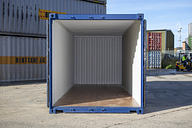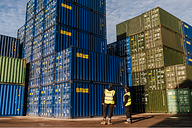In recent times, the unfortunate rise of container scams has left many individuals and businesses facing financial losses and shattered plans. To help you navigate this landscape with confidence, we've compiled a set of ten essential rules that will empower you to make informed decisions when purchasing containers. By following these guidelines and asking the right questions, you can safeguard your investments, avoid hidden costs, and ensure a seamless experience from start to finish.

1. Verify the Trading Company
Before committing to a container purchase, conduct due diligence by checking the legitimacy of the trading company. Companies House provides valuable insights to confirm their authenticity and track record. Please bear in mind that some scammers can succesfully list their fake company and history on Companies House, so please make sure you complete all your other checks.
2. Assess Trading Experience
Consider the length of time the company has been in operation. A well-established and experienced company often signifies stability and reliability in their business practices.

3. Confirm Stock Availability
Don't fall victim to false promises. Ensure that the company has the containers in stock before proceeding with your purchase. If possible, request to see the containers firsthand to avoid costly delays or disruptions to your growth plans.
4. Compare Specifications
Take the time to compare the specifications of the containers you're being quoted with other offerings in the market. Consistency and accuracy in specifications will help you avoid potential discrepancies and ensure you're receiving what you paid for.
5. Uncover Hidden Costs
Beware of hidden costs that may not be initially apparent. By asking the right questions, you can gain clarity on any additional charges, ensuring transparency and preventing unwelcome financial surprises.

6. Inclusive Pricing
When reviewing a quote, determine whether the price includes value-added tax (VAT) and delivery charges. Understanding the complete cost structure upfront allows for accurate budgeting and eliminates unexpected expenses.
7. Evaluate After-Service and Warranty
Prioritise suppliers who offer robust after-service and warranty support. Thoroughly assess the terms and conditions, ensuring the company's reputation and financial stability, so you can rely on them to honour their commitments in the long run.
8. Plan for Future Needs
If future container requirements are likely, consider sourcing all your containers from the same supplier to ensure consistency and compatibility. This approach simplifies logistics and avoids potential compatibility issues.

9. Does the Supplier Offer A Buy Back Scheme?
Peace of mind is essential, especially if your project concludes or unforeseen circumstances arise. Seek suppliers who provide the option to buy back containers, allowing you to protect your investment and pivot when necessary.
10. Protect Your Property
During container delivery, accidents can happen. To safeguard your property and neighbouring properties, ensure that the supplier has suitable insurance coverage and a comprehensive aftercare program. This will provide reassurance and mitigate potential liabilities.
Container scams can have devastating consequences, both financially and logistically. By adhering to these ten golden rules and proactively seeking the necessary information, you can shield yourself from fraudulent activities and make secure container purchases. Remember, expertise and care should be your guiding principles throughout the buying process. Stay vigilant, ask the right questions, and partner with reputable suppliers like Cleveland Containers who prioritise transparency and customer satisfaction.
If you believe that you have been a victim of container fraud in the UK, please report your incident to Action Fraud.
Need our help?
Talk to us about your container project today...
You may also be interested in...

How to Choose the Right Size Shipping Container for Your Needs
Mastering shipping container selection: Understand cargo, sizes, dimensions, types, routes, and modes for hassle-free transportation.

Shipping Container Maintenance 101: Tips for Keeping Your Container in Good Condition
Container maintenance tips: Preserve your shipping container's condition for longevity.

What 'One Trip' Shipping Container Means
Calling One Trips ‘new’ gives the impression that containers will be in a pristine condition, however units are subjected to wear and tear during transport.


.png)
.png)

0 Comment
Please leave a comment using the form below